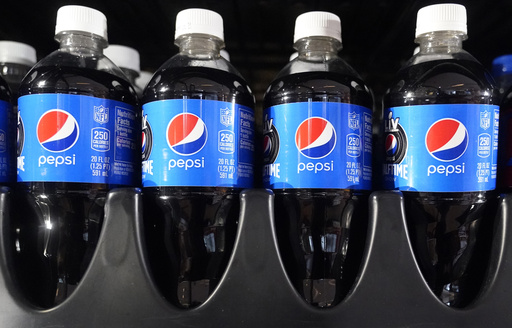PepsiCo announced on Tuesday that shifts in consumer preferences and rising prices have contributed to a decline in U.S. demand for its snack foods and beverages. However, the company remains optimistic about reversing this trend in the upcoming year.
Based in Purchase, New York, PepsiCo reported a small decline in revenue, totaling $27.78 billion for the fourth quarter, falling short of Wall Street’s expectations of $27.89 billion, according to analysts’ assessments.
The demand in the U.S. took a hit last year after experiencing significant price increases for two consecutive years. Specifically, the average price for a 16-ounce bag of potato chips reached a peak of $6.68 in October 2023, as recorded by government statistics.
In response to the downturn, PepsiCo decided to halt further price hikes, with global prices rising only 4% in 2024. The company has made efforts to enhance the affordability of its snacks by introducing various promotional strategies, increasing the quantity of chips per bag, and offering value packs. Additionally, PepsiCo has invested more resources into its budget-friendly brands, Chester’s and Santitas, which reported substantial revenue growth last year.
During a recent conference call, CEO Ramon Laguarta indicated that these initiatives are beginning to yield positive results, as consumers are once again purchasing salty snacks. However, it’s important to note that the sales volumes for both Frito-Lay snacks and beverages in North America experienced a 3% decrease in the last quarter of the year.
Laguarta also highlighted a more extended trend towards healthier snacking options among consumers. Although the company has not seen considerable effects from the rising popularity of GLP-1 weight loss medications like Wegovy, there is a clear consumer shift towards portion-controlled snacks and healthier ingredients, such as whole grains, along with lower sodium and fat content.
“There’s a heightened awareness among American consumers about health and wellness,” he remarked.
PepsiCo is well-equipped to meet this demand with products including Pepsi Zero Sugar, SunChips, and its Simply chip line, which feature no artificial colors or flavors. Moreover, Laguarta mentioned that the company is set to introduce more health-oriented, acceptable snack options in the near future.
“We are very optimistic that our North American business will see acceleration this year,” Laguarta added. In addition, PepsiCo is actively working to boost its products offered away from home, such as partnering with Taco Bell on Doritos Locos Tacos and launching Tostitos Cantina food trucks.
Globally, PepsiCo’s snack and beverage volumes both grew by 1% in the fourth quarter, benefiting from strong performance in markets like Africa and Asia. The company reported a 17% increase in net income to $1.5 billion. When adjusting for one-time financial events, PepsiCo’s earnings were $1.96 per share, exceeding analysts’ predictions by two cents.
Looking ahead, PepsiCo anticipates organic revenue growth in the low single digits for 2025. This figure is adjusted to account for currency fluctuations and any product acquisitions or divestments. In 2024, the company was able to achieve organic revenue growth of 2%. Furthermore, following the closure of four U.S. bottling plants in October, PepsiCo continues its multi-year initiative aimed at improving productivity, which includes incorporating more automation in its facilities and warehouses.
On Tuesday, shares of PepsiCo experienced a 2% dip.
